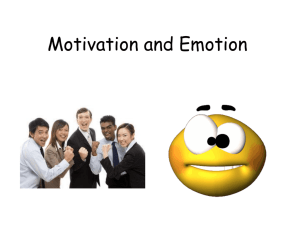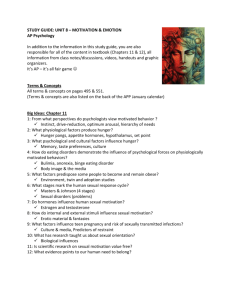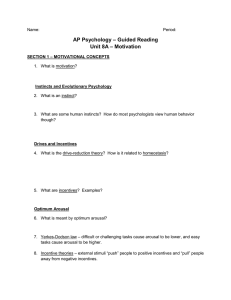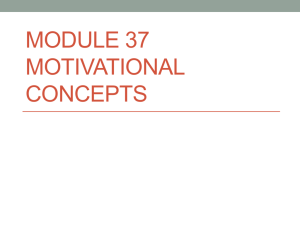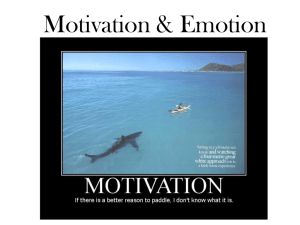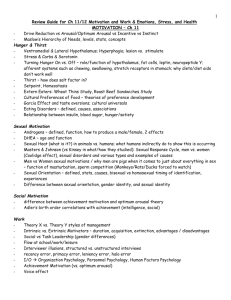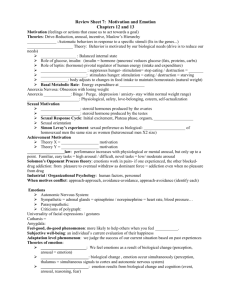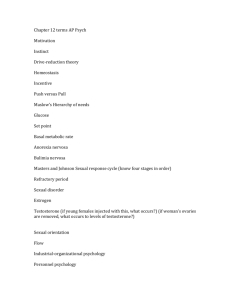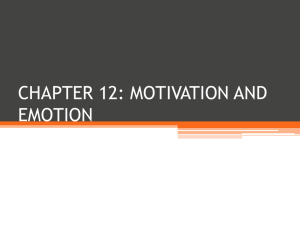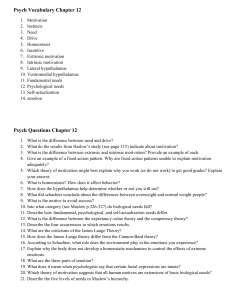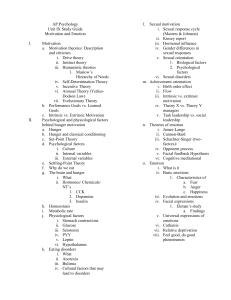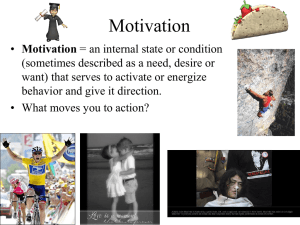Motivation and Emotion
advertisement
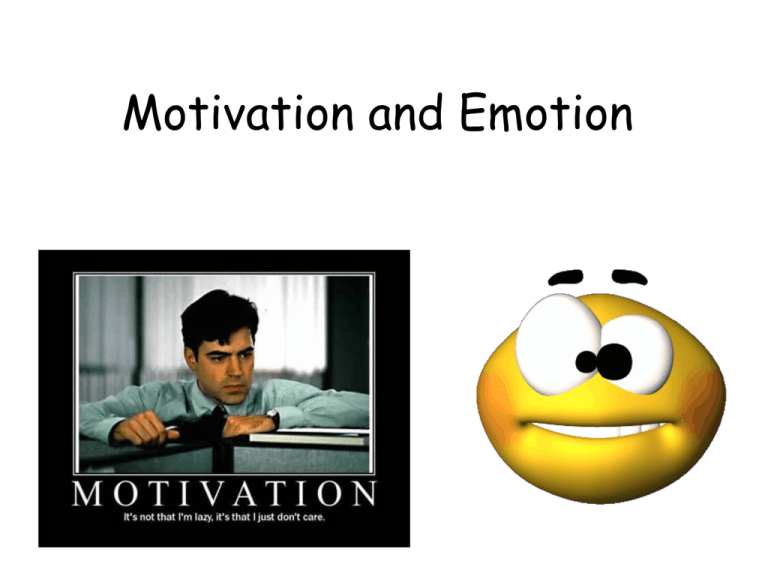
Motivation and Emotion Basic Components of Motivation • Motivation = the drive to begin or maintain behavior • Motive = stimulus moves person toward behavior/goal • Need = lack of something one requires or desires • Drive = force that pushes a person to act • Incentive= force that pulls person toward particular behavior Intrinsic Vs. Extrinsic Motivation • Intrinsic = incentive to perform behavior for self-satisfaction • Extrinsic = incentive to perform for external reward or to avoid punishment Instinct Theory • we are motivated by our innate, unlearned behaviors • “Evolutionary programming” • only explains why we do a small fraction of our behaviors Drive Reduction Theory • behavior = motivated by BIOLOGICAL NEEDS • to maintain homeostasis (organism’s tendency to maintain a balanced state) – When we are not, we have a need that creates a drive. • Primary drive = unlearned, to satisfy basic needs (food) • Secondary drive = learned, but may be attached to primary ($ to buy food) Arousal Theory • Arousal = to incite to action • primary need = to seek an optimum level of arousal • Yerkes-Dodson Law – Low arousal = lethargic/perform badly – Arousal increate = performance increases – Too much arousal = decrease performance Humanistic Theory • Proposed by Maslow • Humans have needs beyond those of survival and reducing drives • Need to do something important with one’s life = as important as basic biological needs • Must satisfy lower needs FIRST Complete and Share Maslow Chart HUNGER as Motivation Biological Basis of Hunger • Hunger does NOT come from our stomach. It comes from our… • Brain What part of the brain? • The Hypothalamus Hypothalamus Lateral Hypothalamus • When stimulated it makes you hungry. • If lesioned (destroyed) one will never be hungry again Ventromedial Hypothalamus • When stimulated you feel full. • If lesioned one will never feel full again. Set Point Theory • hypothalamus = acts like a thermostat • Wants to maintain a stable weight. • Activate the lateral when you diet and activate the ventromedial when you start to gain weight. Body Chemistry Theory • Glucose • The hormone insulin converts glucose to fat. • When glucose levels drop- hunger increases. External Vs Internal Hunger Factors • External – Stress – Eating habits (breakfast, lunch, dinner) – Food-related cues (eating dessert even if full) – Presence of eating cues (time of day) • Internal – Hypothalamus (chemicals released in brain) – Basal metabolic rate (rate of burning food) – Body set point (weight loss or gain) – Taste sensation (taste buds react to food) Sexual Motivation • Sex is natural. • Without sex, none of us would be here. • How do scientists (or you) find out about sex? YOU ASK!!!!!! Kinsey’s Studies • Confidential interviews with 18,000 people (in early 1950’s). • Sexual Behavior in the Human Male and Sexual Behavior in the Human Female • Scale of sexuality….0 to 6 where 0 is exclusively heterosexual and 6 homosexual and 7 is asexual. Click on Kinsey to see the movie trailer. Masters and Johnson Study • In the 1960’s William Masters and Virginia Johnson set out to explore the physiology of sex. • 382 females and 312 males. After their research was done they ran an institute that claimed to turn gay people straight. Click on Masters and Johnson to see a more detailed explanation of their research. Mapped out the Sexual Response Cycle • • • • Initial Excitement Plateau Phase Orgasm Resolution Phase (with refractory period). Psychological Factors in Sexual Motivation • Only some people are externals when it comes to hunger- but we are all externals when it comes to sex. • Heiman 4 tape study. • People can find sexually explicit images either pleasing or disturbing- but they are none the less biologically arousing. We have discussed the energizing of sexual motivation but have yet to discuss its direction: Sexual Orientation An enduring sexual attraction toward members of either one's own gender or the other gender. Percentage, brothers and cities How is Sexual Orientation Determined • There has been NO evidence that sexuality is socially determined. • Kids raised by gay parents are no more likely to be gay that if they were raised by hetero parents. • This it is likely biologically determined. The Brain • Simon LeVay discovered that there is a cluster of cells in the hypothalamus that is larger in heterosexual men than in heterosexual women or homosexual men. Prenatal Environment • Current research seems to point to the hormonal levels in the prenatal environment. • We have created homosexual male fruit flies and lesbian sheep!!! Achievement Motivation What motivates us to work? (School, job, sports, video games, relationships etc..) Intrinsic Motivators • Rewards we get internally, such as enjoyment or satisfaction. Extrinsic Motivators • Reward that we get for accomplishments from outside ourselves (grades or money or etc..) • Work great in the short run. Management Theory Management/Teaching styles relate closely to Intrinsic/Extrinsic Motivators. Theory X • Managers believes that employees will work only if rewarded with benefits or threatened with punishment. • Think employees are Extrinsically Motivated. • Only interested in Maslow’s lower needs. Theory Y • Managers believe that employees are internally motivated to do good work and policies should encourage this internal motive. • Interested in Maslow’s higher needs. When Motives Conflict • approach-approach conflict • avoidance-avoidance conflict • approach-avoidance conflict • Multiple approachavoidance conflicts Emotion • Willam James and Carl Lange came up with the James-Lange Theory of Emotion. • We feel emotion because of biological changes caused by stress. • The body changes and our mind recognizes the feeling. Cannon-Bard Theory of Emotion • Say James-Lange theory is full of crap. • How can that be true if similar physiological changes correspond with drastically different emotional states. • The physiological change and cognitive awareness must occur simultaneously. • They believed it was the thalamus that helped this happen. Two-Factor Theory of Emotion • Stanley Schachter explains emotions more completely that the other two theories. • They happen at the same time but… • People who are already physiologically aroused experience more intense emotions than unaroused people when both groups are exposed to the same stimuli. • Biology and Cognition interact with each other to increase the experience. Stress • Social readjustment rating scale (SRRS) • Life Changing Units (LCUs)- marriage, change job, etc… • The more LCUs you have the higher your score is on the SRRS. • Those who score higher are more likely to have stress related disease. Seyle’s General Adaptation Syndrome • Describes our response to a stressful event. • Three stages 1. Alarm 2. Resistance 3. Exhaustion
